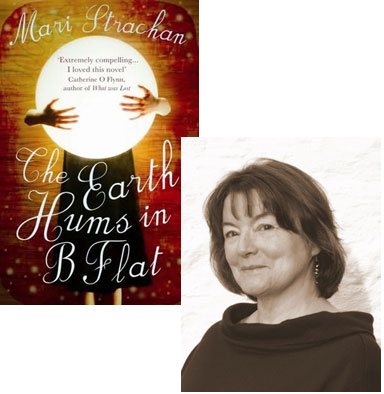Mari Strachan: A Welsh Novel in English

In a few months, Canongate will be publishing The Earth Hums in B-Flat, the debut novel from Mari Strachan, in the United States, but it’s been out for a while in the United Kingdom—in fact, it’s this week’s selection on BBC Radio 4’s “Book at Bedtime. I’ve been reading a copy of the British edition, and I’m enjoying the story, which Strachan describes as “written in English [but] told in Welsh,” so I encourage American readers to keep an eye out for it. And about that English/Welsh thing? Well, Strachan had an explanation for that, which I’m glad to be able to share with you.
My first language is Welsh, and I learnt English when I started school. At the time when I grew up, Welsh was the language of our hearth and our identity but English was the language of our education, at least at secondary and university levels. So, I speak Welsh to my family—my mother and aunt, my sister, my children and my grandchildren—and I use it in everyday life in shops, cafes, with friends and neighbours and so forth; but because there is a great gap between spoken and written Welsh, I lack the confidence and the practice to use it as a vehicle for my literary efforts.
There’s also the question of who I’m writing the book for. I’m not conscious of writing for any particular audience when I’m working, but I am conscious that I have a desire to explain Wales and the Welsh identity to people who are unaware of them, both within the British Isles and without. The book’s narrator is growing up in a Welsh speaking community where she would not naturally speak English. To make the point that she’s talking to the reader in Welsh I occasionally have someone say something ‘in English’. I had to consider very carefully how to write the Welsh in English, and decided that I would avoid ‘Welshisms’ but use proper names as they would be in Welsh.
I have been surprised by the number of people who have told me they can hear a Welsh ‘lilt’ in the writing. I’m not sure if that is because they expect to hear it, or whether somehow the rhythms and sounds of my first language colour the writing of my second. It’s interesting that in the British Isles only one reviewer, so far, has recognised what I’m attempting to do—an Irish reviewer, whose history has also been shaped by the influence of English governance and its language.
Welsh writing in English became part of the literature of Wales during the twentieth century. Until then, the literature of Wales was in Welsh. It is one of the oldest literatures in Europe, dating back to the prose poems of the sixth century and the oral tales of the Mabinogion put into writing in the thirteenth century, and it continues to flourish in this century, in all genres. There has been an understandable tension between the two literatures during the last century, which I suspect will never entirely dissipate. Some of us who write in English although we are Welsh speaking feel a guilt which is difficult to assuage, a feeling that we are letting down the language of our heredity and hearts. Some non-Welsh speaking Welsh writers argue that Welsh writing in English is the real literature of Wales, because the number of non-Welsh speakers in Wales is four times greater than the number of Welsh speakers, but that is to forget the centuries of writing in Welsh that has gone before them.
My next book is also in Welsh written in English. I don’t know how else to truly portray the people whose stories I’m writing and make those stories accessible to the rest of the world. The Earth Hums in B-Flat is being published in the US and Australia, but it is also being translated into several European languages. Some of the editors and translators have told me that they knew nothing of Wales previously, and the translators who have been in touch with me are particularly interested in the language. I wish I could read their languages so that I could see what they make of the Welsh in English in translation!
30 March 2009 | guest authors |

 Our Endless and Proper Work is my new book with Belt Publishing about starting (and sticking to) a productive writing practice.
Our Endless and Proper Work is my new book with Belt Publishing about starting (and sticking to) a productive writing practice. 
